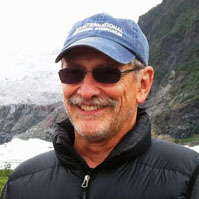Michael Stekoll, Ph.D.
Michael Stekoll, Ph.D.
Professor of Chemistry and Biochemistry, Emeritus
Arts and Sciences — Natural Sciences
Education
- B.S., 1971, Stanford University
- Ph.D., 1976, University of California Los Angeles
Research Interests
The biological communities along most of the rocky shores of Alaska are defined by the marine plant associations. A major portion of the primary production throughout the year is provided by the benthic plants in the nearshore. These communities are often disturbed not only by natural phenomena, such as winter storms and ice, but also by anthropogenic disturbances such as harvesting and pollution.
My research has concentrated in both basic and applied aspects of the biology and ecology of marine benthic plants and on the effects of disturbances on this community. My associates and I have investigated the effects of harvest and pollution on the intertidal and subtidal seaweeds. We have also developed techniques fore using remote sensing to map floating kelp beds in SE Alaska.
We have conducted applied research on the commercial exploitation of seaweeds. In addition to performing seaweed resource assessments for potential commercial harvest, we have investigated the potential of mariculture as a means to enhance exploited algal resources. There are many organisms that can be cultured which have potential to be developed as a high value product. Among these are seaweeds such as Macrocystis(giant kelp), Nereocystis (bull kelp) and Porphyra (nori). My lab has worked out the procedures for the successful mariculture of the kelps Macrocystis. Alaria,andSaccharina. We have researched the physiological ecology of Porphyra as it relates to its culture. This plant can be marketed both as nori for the sushi and health food market and as black seaweed for the Native community. Our latest project is investigating applied aspects of the mariculture of Saccharina latissima (sugar kelp). I am also involved in kelp ecology and mariculture studies in South Africa in cooperation with colleagues at the University of Cape Town.
Other "non seaweed" projects have involved the effects of pollution on salmon and herring. We completed research on the potential impacts of mining activities on the nearshore benthos, and have investigated the effects of common ions (hard water) from mine wastewater on the growth and development of coho salmon. Other projects have been research on delayed effects of oil exposure on zebra fish as a model for salmonid exposure and the toxicity of creosote pilings to the development of herring embyros.
Michael Stekoll, Ph.D.
Professor of Chemistry and Biochemistry, Emeritus
Arts and Sciences — Natural Sciences

- Email address: msstekoll@alaska.edu
- Phone number: 907-796-6518
- Fax number: 907-796-6447
- Building location: Anderson Bldg 205E, Juneau Campus
- Word file CV